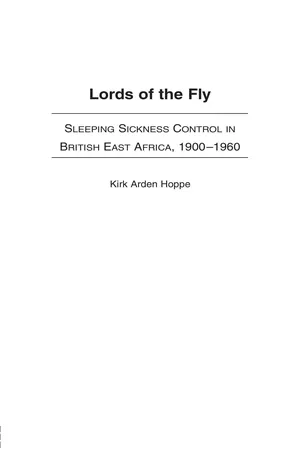
Lords of the Fly
Sleeping Sickness Control in British East Africa, 1900-1960
- 224 pages
- English
- PDF
- Available on iOS & Android
About this book
British sleeping sickness control in colonial Uganda and Tanzania became a powerful mechanism for environmental and social engineering that defined and delineated African landscapes, reordered African mobility and access to resources. As colonialism shifted from conquest to occupation, colonial scientists exercised much influence during periods of administrative uncertainty about the role and future of colonial rule. Impartial and objective science helped to justify the British civilizing mission in East Africa by muting the moral ambiguities and violence of colonial occupation. Africans' actions shaped systems of western scientific knowledge as they evolved in colonial contexts. Bridging what might otherwise be viewed as the disparate colonial functions of environmental and health control, sleeping sickness policy by the British was not a straightforward exercise of colonial power. The implementation of sleeping sickness control compelled both Africans and British to negotiate. African elite, farmers, and fishers, and British administrators, field officers, and African employees, all adjusted their actions according to on-going processes of resistance, cooperation and compromise. Interactions between colonial officials, their African agents, and other African groups informed African and British understandings about sleeping sickness, sleeping sickness control and African environments, and transformed Western ideas in practice.
Frequently asked questions
- Essential is ideal for learners and professionals who enjoy exploring a wide range of subjects. Access the Essential Library with 800,000+ trusted titles and best-sellers across business, personal growth, and the humanities. Includes unlimited reading time and Standard Read Aloud voice.
- Complete: Perfect for advanced learners and researchers needing full, unrestricted access. Unlock 1.4M+ books across hundreds of subjects, including academic and specialized titles. The Complete Plan also includes advanced features like Premium Read Aloud and Research Assistant.
Please note we cannot support devices running on iOS 13 and Android 7 or earlier. Learn more about using the app.
Information
Table of contents
- Figures
- Preface and Acknowledgments
- Chapter 1 Introduction
- Chapter 2 The Scramble for Sleeping Sickness: Imperial Interests and the Rise of Colonial Science
- Chapter 3 Depopulations and Safe Corridors in Colonial Uganda, 1906–1920
- Chapter 4 The Shift to Tanganyika, 1920–1935
- Chapter 5 Forced Resettlement in Tanganyika and Uganda, 1935–1960
- Chapter 6 Labor, Land, and Colonial Disease Control
- Chapter 7 Conclusion
- Epilogue
- Abbreviations Used in Notes
- Selected Bibliography
- Index